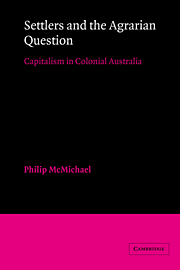Book contents
- Frontmatter
- Contents
- List of tables
- Preface
- 1 The social structure of British hegemony
- PART I THE COLONIAL ECONOMY ENTERS THE WORLD MARKET (1788–1830)
- PART II THE SQUATTING PHASE OF PASTORALISM (1830s AND 1840s)
- 4 Squatting and colonial politics
- 5 Merchants and growers
- 6 Pastoral enterprise in the colonial economy
- 7 The conservative character of pastoralism
- PART III CONFRONTING THE AGRARIAN QUESTION (1840–1900)
- APPENDIXES
- References
- Index
4 - Squatting and colonial politics
Published online by Cambridge University Press: 18 December 2009
- Frontmatter
- Contents
- List of tables
- Preface
- 1 The social structure of British hegemony
- PART I THE COLONIAL ECONOMY ENTERS THE WORLD MARKET (1788–1830)
- PART II THE SQUATTING PHASE OF PASTORALISM (1830s AND 1840s)
- 4 Squatting and colonial politics
- 5 Merchants and growers
- 6 Pastoral enterprise in the colonial economy
- 7 The conservative character of pastoralism
- PART III CONFRONTING THE AGRARIAN QUESTION (1840–1900)
- APPENDIXES
- References
- Index
Summary
INTRODUCTION
During the 1830s, extensive squatting on the frontier and increased profits in the wool trade transformed colonial social organization and politics. The success of colonial wool in the world market consolidated a pastoral economy, contradicting the reformed imperial policy toward colonial development. Although in 1831 the Colonial Office had instituted reforms for “systematic colonization,” wholly unsystematic occupation of Crown lands beyond official boundaries followed. A paradox emerged: A mercantilist relationship with the imperial economy strengthened with the burgeoning wool trade, whereas politically antimercantilist forces developed in both the colony and the imperial state. In the latter, the growing problem of unemployed labor necessitated a reconceptualization of the settler colony as a host to free, rather than convict, labor. This was the source of the so-called positive theory of empire, which anticipated self-government. It was also consistent with the liberal reform currents within Britain, as commercial and manufacturing classes challenged the monopoly of political power in the hands of the landed classes.
Within colonial Australia political transition combined two movements. On the one hand, emancipists solidified democratic opposition to the patriarchal structure of the colonial state, in which the exclusive pastoral gentry aspired to aristocratic rule through their privileged relationship to the governor. On the other hand, the impact of squatting, in conjunction with the cessation of convict labor at the end of the 1830s, undermined the social organization of a colonial aristocracy. As the landed economy shifted to extensive squatting and the Colonial Office encouraged middle-class emigrés and a free labor force to replace convict labor, the props of the landed aristocracy disappeared.
- Type
- Chapter
- Information
- Settlers and the Agrarian QuestionCapitalism in Colonial Australia, pp. 79 - 100Publisher: Cambridge University PressPrint publication year: 1984



